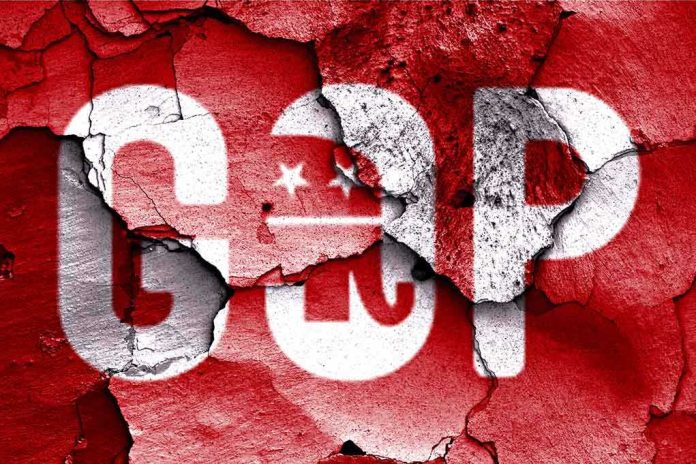
Republican senators stunned their own base by siding with Democrats to undercut President Trump’s hardline tariffs on Brazil, exposing deep fractures within the GOP over economic nationalism versus free trade orthodoxy.
Story Snapshot
- Several Senate Republicans joined Democrats to block Trump’s 50% tariff on Brazilian goods.
- The razor-thin vote highlighted enduring Republican divides over tariffs and trade policy.
- This move signals a possible shift in GOP priorities away from Trump-era protectionism.
- The outcome raises questions about the party’s loyalty and the future of conservative economic strategy.
Republican Rebellion in the Senate: The Tariff Vote That Shook Washington
Senate chambers rarely see fireworks on tariff policy, but Tuesday night’s vote was an exception. A handful of Republican senators broke ranks with their party’s de facto leader, Donald Trump, to support a Democrat-led resolution zeroing out the administration’s proposed 50% tariff on Brazilian imports. The resolution’s passage, secured by a narrow margin, sent a clear message: not all Republicans are ready to march in lockstep on Trump’s economic agenda. The drama unfolded in full view, and the implications could reverberate through both party politics and American trade policy for years to come.
As the votes were tallied, the tension in the chamber was palpable. Republican senators who had long championed free markets found themselves at odds with an administration that has made tariffs a signature policy tool. The resolution’s supporters argued that steep tariffs would hurt American consumers and businesses, particularly in sectors reliant on Brazilian goods. Critics, including Trump loyalists, countered that robust tariffs are vital to protecting American industries from unfair foreign competition. The debate was as much about the soul of the Republican Party as it was about economics—a battle between the old guard’s free trade gospel and a new wave of economic nationalism.
BREAKING: The Senate voted 52–48 to overturn Donald Trump’s 50% tariffs on Brazil. Five Republicans joined Democrats in supporting the measure:
Mitch McConnell
Rand Paul
Thom Tillis
Susan Collins
Lisa Murkowski
pic.twitter.com/wfIXPOKMY5— Republicans against Trump (@RpsAgainstTrump) October 28, 2025
The Old Guard Versus Trump’s Economic Nationalism
The GOP has historically prided itself on free-market principles, but Trump’s presidency upended those assumptions. Many Republican lawmakers embraced tariffs as a tool to pressure trading partners and bolster domestic industries. However, Tuesday’s vote revealed that the party’s consensus is crumbling. Senators who voted to block the tariffs cited economic studies warning of higher prices for American families and possible retaliation from Brazil, threatening export-dependent U.S. farmers. The split exposed a lingering unease: Should the party double down on Trump’s America-First economics, or return to its pro-trade roots? The answer remains unresolved, but the vote was a public airing of the party’s internal tensions.
Republicans who sided with Democrats faced swift backlash from conservative activists and pro-Trump commentators. Social media lit up with accusations of betrayal and warnings that these senators could face primary challenges. Yet, some lawmakers appeared unmoved, insisting their job is to defend their constituents’ interests, not just the president’s agenda. The episode underscores a broader trend—Republican unity on economic issues can no longer be taken for granted. The old coalition is splintering, and each high-profile vote forces senators to pick a side, often at their political peril.
Foreshadowing Economic and Political Ripples
The decision to block Trump’s tariffs may have immediate economic effects but could also shape the party’s identity heading into future elections. If tariffs remain a litmus test for Republican loyalty, expect more public splits and internal feuding. The outcome could empower Democrats to seek bipartisan support for other trade-related measures, knowing GOP discipline is no longer ironclad. At the same time, the episode leaves Trump’s grip on the party looking a little less certain. Voters and donors alike will be watching closely to see whether economic pragmatism or ideological loyalty wins out in the long run.
The Larger Conservative Conversation: Loyalty, Policy, and the Path Forward
This episode is more than a dust-up over trade; it’s a referendum on what it means to be a conservative in the post-Trump era. The Senate vote threw into sharp relief the challenge of reconciling pro-business, free-trade traditions with the populist, protectionist instincts Trump tapped so effectively. For Republican voters aged 40 and above—many of whom recall the Reagan years of trade expansion—these developments may feel like whiplash. Will the GOP re-embrace free markets, or has Trump’s brand of economic nationalism permanently shifted the party’s DNA? The answer remains elusive, but the debate is far from over. Those who crave certainty may want to buckle up: the next chapter in this saga promises more drama, more infighting, and more surprises as the party charts its future.
Sources:
List of Republicans Who Voted Against Trump’s Emergency Brazil Tariffs



